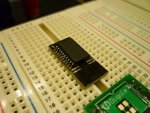I had put a kit form of the DS-1307 RTC together a while ago for another group.
Due to discussions in another thread i had posted some of the data from the kit.
This generated a little interest in the information so here is the full kit data altogether. (see PDF File)
The DS-1307 is a wonderful little chip and dispite some timing errors reported on the forum i have not yet encounted such problems, once the chip is written to and correctly setup.
It requires I2C protocol to operate and hence only compatable with the 18X and above with I2C functions.
It do have a SQW/OUT (square wave out) pin that can be set to several frequencys including a 1Hz signal, and you do not need I2C to read this pin, so once programmed it can be used as a time base with 08m's etc if a accutate 1Hz signal is required.
It will need to be programmed with I2C first.
It has a backup battery pin that will allow the chip to retain settings and memory if the main power supply is disconnected.
A lithum 3 volt cell will give in excess of 10 years backup operation without the need to recharge or replace the battery.
It also has Leap-Year Compensation Valid Up to 2100 so it should see most of us out for the next 90 years.
.
.
.
Due to discussions in another thread i had posted some of the data from the kit.
This generated a little interest in the information so here is the full kit data altogether. (see PDF File)
The DS-1307 is a wonderful little chip and dispite some timing errors reported on the forum i have not yet encounted such problems, once the chip is written to and correctly setup.
It requires I2C protocol to operate and hence only compatable with the 18X and above with I2C functions.
It do have a SQW/OUT (square wave out) pin that can be set to several frequencys including a 1Hz signal, and you do not need I2C to read this pin, so once programmed it can be used as a time base with 08m's etc if a accutate 1Hz signal is required.
It will need to be programmed with I2C first.
It has a backup battery pin that will allow the chip to retain settings and memory if the main power supply is disconnected.
A lithum 3 volt cell will give in excess of 10 years backup operation without the need to recharge or replace the battery.
It also has Leap-Year Compensation Valid Up to 2100 so it should see most of us out for the next 90 years.
.
.
.
Attachments
-
241.1 KB Views: 891


